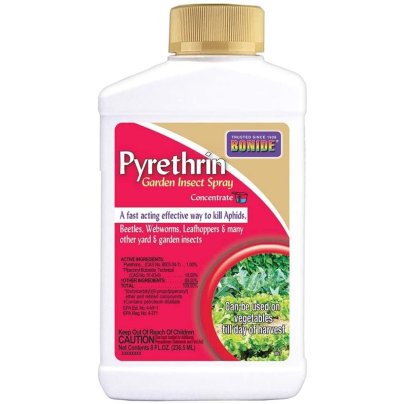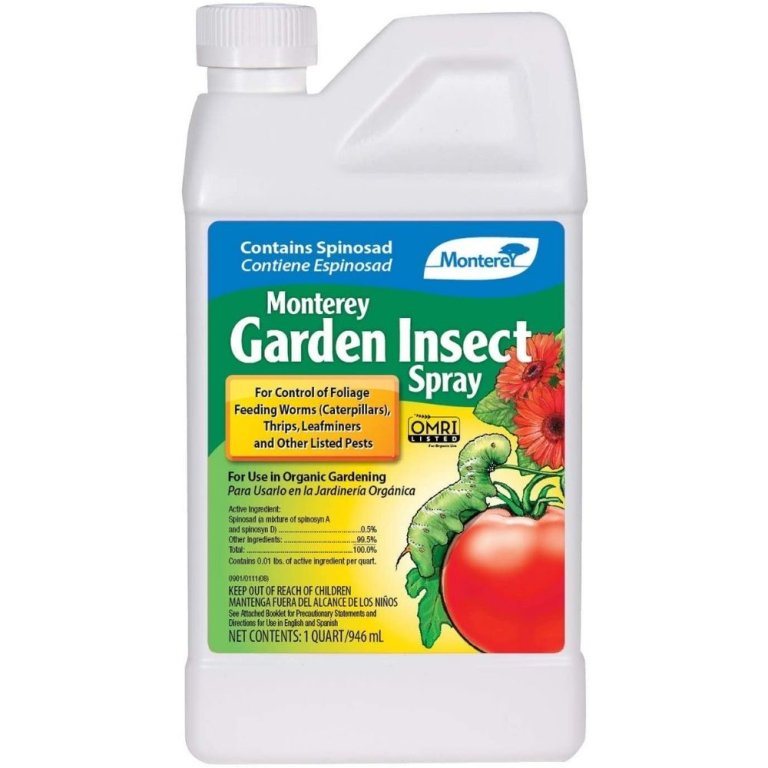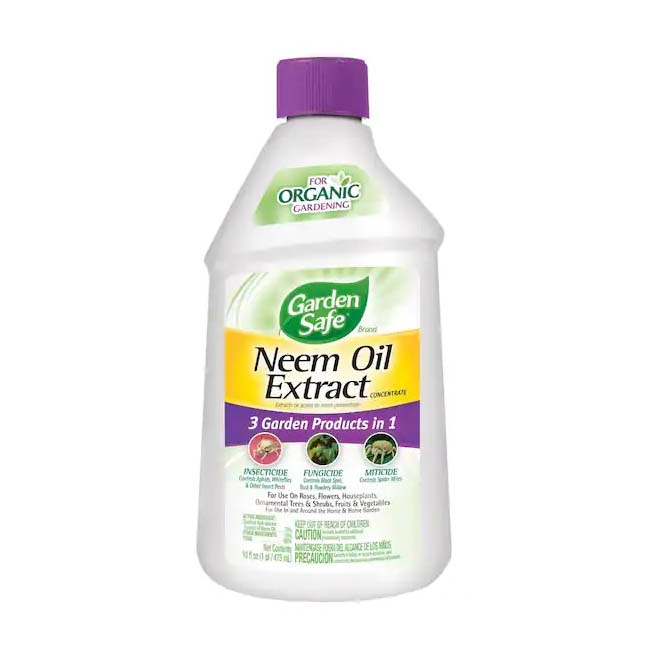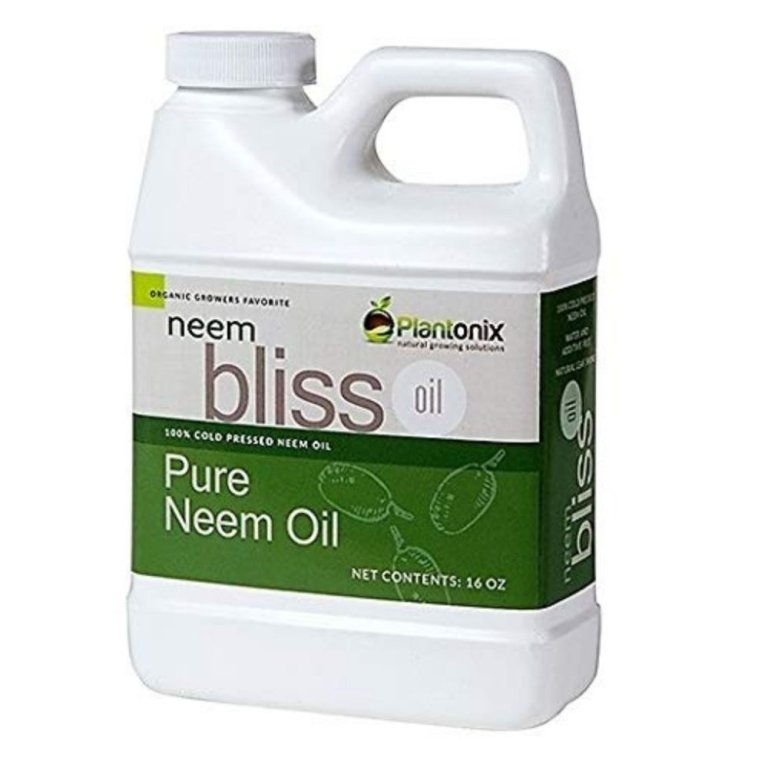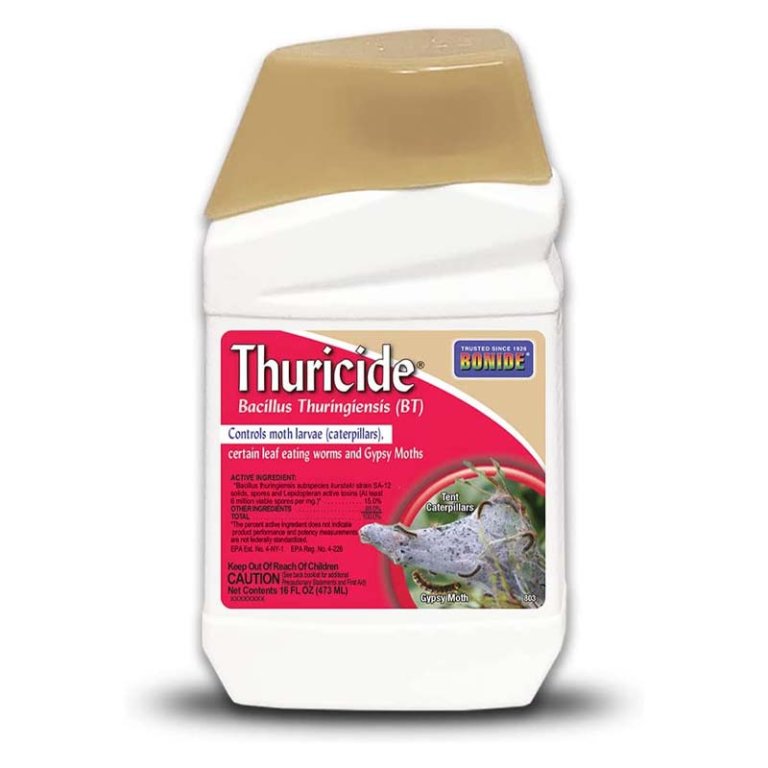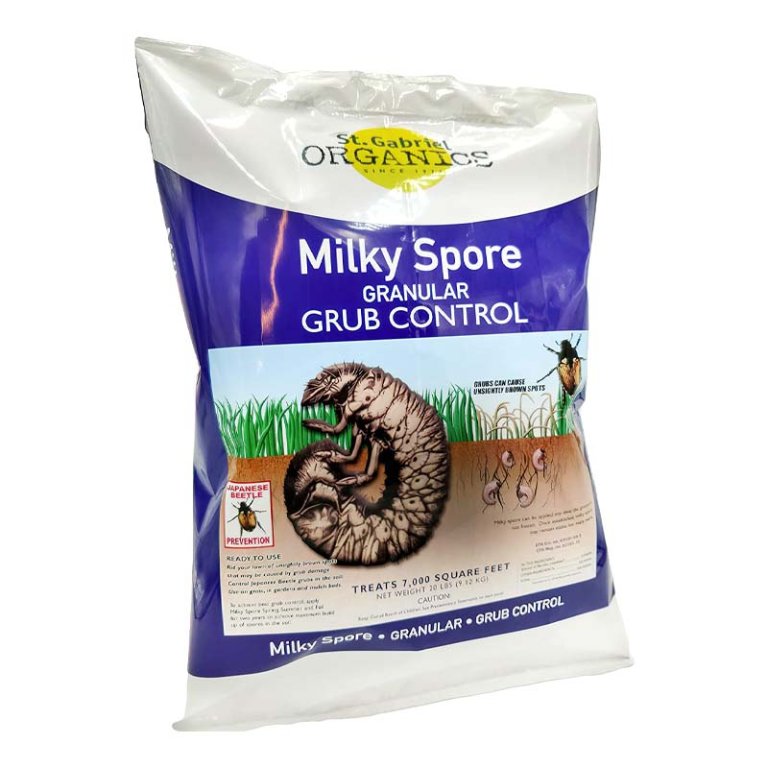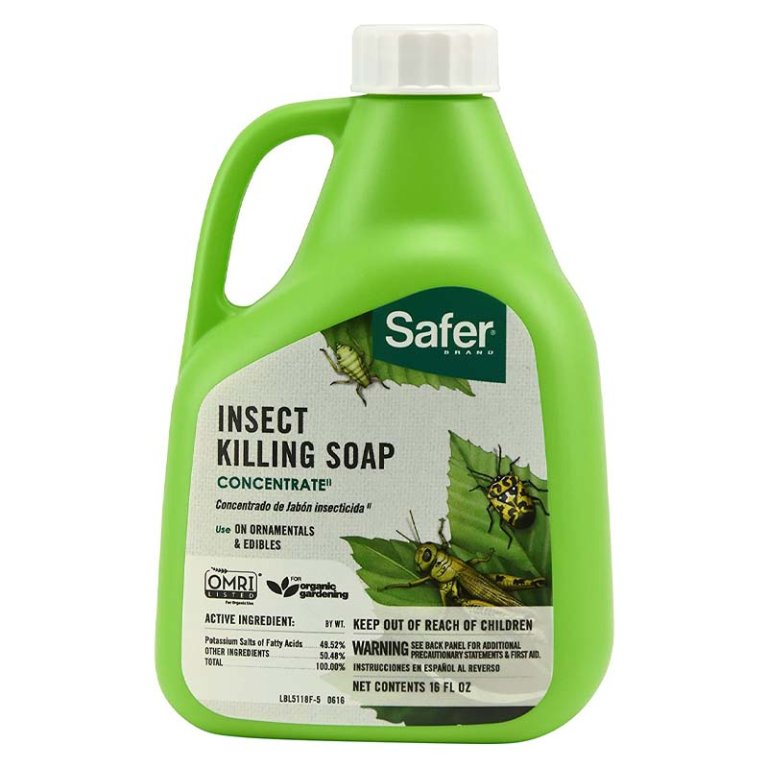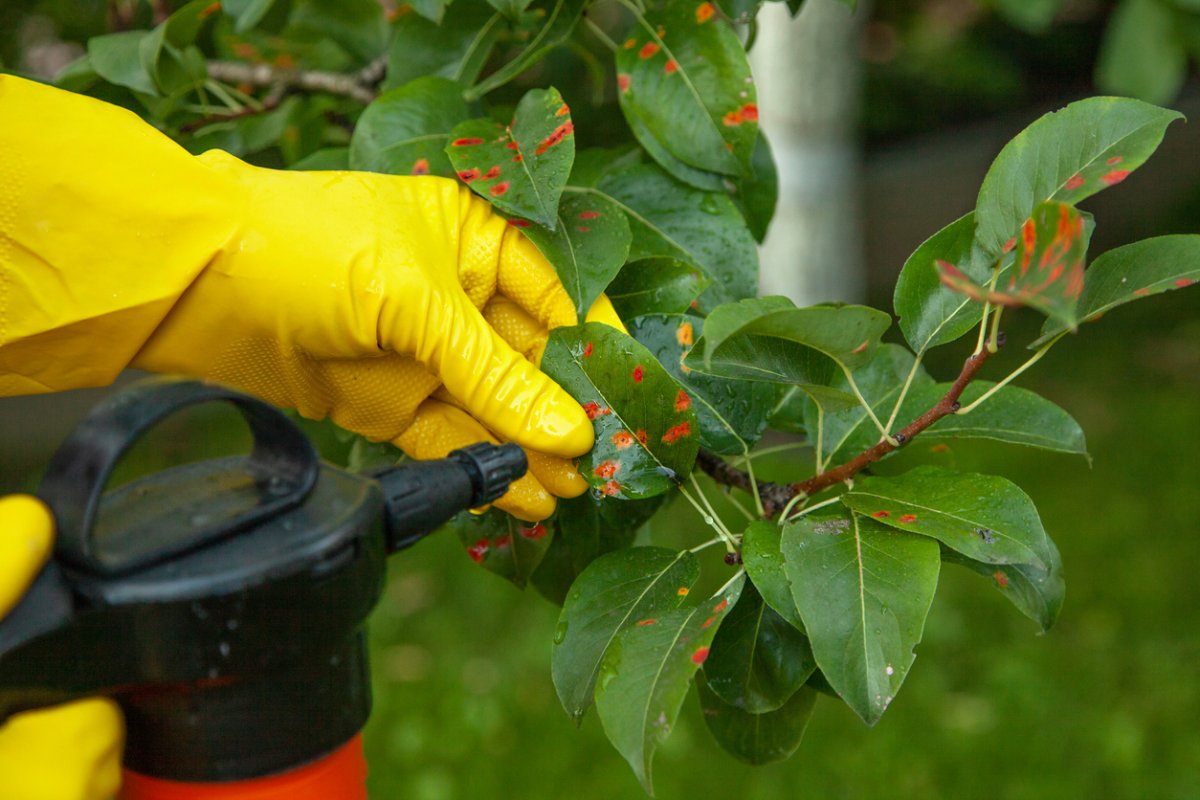
We may earn revenue from the products available on this page and participate in affiliate programs. Learn More ›
Insects are part of a healthy garden ecosystem as bees and other pollinating insects ensure a plentiful harvest from herb and veggie gardens and fruit trees, while ladybugs and praying mantises help control plant-damaging pests, much like insecticides for vegetable gardens. When fruit worms, aphids, Japanese beetles, roaches, and their destructive ilk gain a toehold in a garden, they can quickly ruin crops. A targeted insect killer can help prevent this.
The best insecticides for pest control in vegetable gardens are fast and effective at killing destructive bugs without harming their beneficial brethren—or pets and humans. They’re even better when they’re easy to apply without specialized equipment.
Our favorite insecticide for vegetable gardens is the Bonide Pyrethrin Garden Insect Spray Concentrate since it provides effective control over multiple pests, is made with biodegradable ingredients, and is residue-free. However, all of the products on this list have been thoroughly vetted for effectiveness and reliability.
Read on to learn how the best insecticides for vegetable gardens work and why the following options rank as some of the best in their respective categories.
- BEST OVERALL: Bonide Pyrethrin Garden Insect Spray Concentrate
↓ Jump to Review - RUNNER-UP: Monterey Garden Insect Spray
↓ Jump to Review - BEST BANG FOR THE BUCK: Garden Safe Neem Oil Extract Concentrate
↓ Jump to Review - BEST BOTANICAL: Plantonix Neem Bliss 100% Cold Pressed Neem Oil
↓ Jump to Review - BEST INSECTICIDAL SOAP: Natria Ready-to-Use Insecticidal Soap
↓ Jump to Review - BEST LONG-LASTING: BioAdvanced Vegetable & Garden Insect Spray
↓ Jump to Review - BEST FOR CATERPILLARS: Bonide BND803 Thuricide Concentrate
↓ Jump to Review - BEST FOR JAPANESE BEETLES: St. Gabriel Organics Milky Spore Grub Control
↓ Jump to Review - BEST FOR APHIDS: Safer Brand Insect Killing Soap Concentrate
↓ Jump to Review

Before You Buy Insecticide for Vegetable Gardens
While we understand that chemical insecticides are an effective way of warding off insects that can wreak havoc on a garden, Bob Vila believes there are more responsible ways to protect your garden from destructive pests.
The fact is that there’s often collateral damage even with well-intentioned eco-friendly products. The best insecticides will undoubtedly take out some beneficial insects along with the pests you’re trying to eliminate. Given that some of these species are so beneficial to the environment—honeybees, for example—it’s good sense to first consider some nonlethal options.
Essential oils are safe and effective repellents. Peppermint, rosemary, and thyme oil will repel a variety of garden pests ranging from squash bugs to caterpillars.
Companion planting is also an excellent alternative to pesticides for vegetable gardens. This method calls for gardeners to pair vegetable plants with other plants that naturally ward off pests. For example, planting basil with tomatoes repels tomato hornworms while attracting bees that improve tomato yields. Placing potted mint plants in a garden will deter aphids, ants, and certain types of beetles.
These natural methods for repelling bugs are often all that’s needed to protect vegetable gardens.
How We Chose the Best Insecticide for Vegetable Gardens
Healthy plants are resilient to minor insect infestations. Sometimes, though, outside influences lead to big bug problems, and gardeners may need a little help. When garden ecology gets out of balance, it may be necessary to spray powerful insecticides. The best insecticides may have either synthetic or organic formulas, are long-lasting and effective, and work on an array of noxious pests.
The above list includes natural and chemical formulas that are made to target specific pest types or a variety of insects at once. Many are also odorless; leave no residue; and are safe for multiple plant, lawn, and houseplant types. Plus, some select options can be used both indoors and outdoors.
The above bug killers also avoid damaging beneficial insects while being safe to use around people, children, and animals. Be advised that some do not come with insecticide sprayers and require dilution before use.
Our Top Picks
There are many options when it comes to insecticides for a vegetable garden. Listed below are some of the best in specific categories. These garden insecticides are made by the most trusted brands in the industry to control difficult pests effectively, yet are safe for people and pets when used as directed. The products we chose use formulas that have minimal impact on the environment while also being generally safe to use around pets and children.
Best Overall
Bonide Pyrethrin Garden Insect Spray Concentrate
See ItWhat We Like
- Biodegradable pyrethrin formula is fast acting and leaves no residue
- Works for multiple pests without harming any vegetables, fruits, flowers, or other beloved plants
- Comes with enough concentrate to make gallons of insecticide
- Affordable price point compared to other options on the market
What We Don’t Like
- No sprayer is included with the purchase; must be diluted and poured manually
- Can kill beneficial insects like honeybees; should be applied a safe distance from any hives
Product Specs
- Type: Chemical liquid for spraying
- Targeted pests: Aphids, beetles, webworms, leafhoppers, and more
- Quantity: 8 ounces
Fast and effective Bonide pyrethrin garden insect spray controls aphids, beetles, webworms, leafhoppers, and many other yard and garden insects on vegetables, trees, flowers, and ornamental plants. Pyrethrin, one of the active ingredients, naturally occurs in chrysanthemums and is considered one of the best biodegradable insecticides. However, it is highly toxic to honey bees, so it’s best to use at dawn or dusk when bees tend to be less active.
It kills insects by targeting their nervous systems and quickly degrades, leaving no objectionable residue. Bonide pyrethrin garden insect spray is a safe insecticide for garden vegetables up to the day of harvest. Mix the concentrate with water and apply with a sprinkler can, hand sprayer, or low-pressure sprayer.
Get the Bonide pyrethrin insecticide for vegetable gardens at Amazon or The Home Depot.
Runner-up
Monterey Garden Insect Spray
See ItWhat We Like
- Effective turnaround time of 1 to 2 days after a single application for peak results
- Organic Materials Review Institute (OMRI)-certified spinosad formula
- Safe insecticide for plants, including fruits, vegetables, and flowers
- Effective on a variety of insects for peak versatility in 1 product
What We Don’t Like
- Expensive compared to other options currently available
- Sprayer not included with purchase; needs to be diluted and poured before use
Product Specs
- Type: Organic liquid for spraying
- Targeted pests: Caterpillars, leaf miners, loopers, trips, moths, fruit flies, borers, flea beetles
- Quantity: 16 ounces
Monterey garden insect spray rapidly controls many insects, including caterpillars, leaf miners, codling moth, tent caterpillars, thrips, borers, and fire ants. Use this insecticide spray on vegetable plants, lawns, and outdoor ornamentals. The active ingredient, spinosad, is a bacterial product produced by fermentation. Spinosad affects the nervous system of insects that consume it, killing them within 1 to 2 days.
It’s odorless, approved for organic gardening for beginners and pros, safe around people and pets, and can be used up to the day of harvest. It comes as a liquid concentrate. To use, mix with water according to label directions and apply with a trigger, handheld, backpack, or hose-end sprayer.
Get the Monterey insecticide for vegetable gardens at Amazon (32 ounces) or The Home Depot (16 ounces).
Best Bang For The Buck
Garden Safe Neem Oil Extract Concentrate
See ItWhat We Like
- Organic and eco-friendly neem oil formula works as a repellent and pesticide
- Fights against fungus, black spot, and rust for excellent versatility
- Works on a variety of insects without harming plants, vegetables, and trees
What We Don’t Like
- Can harm beneficial insects as well as pests; apply with care
Product Specs
- Type: Oil spray
- Targeted pests: Aphids, whiteflies, spider mites, beetles, leaf rollers
- Quantity: 10 ounces
If bugs aren’t the only thing threatening plants, Garden Safe neem oil may come to the rescue—at a great price. It quickly kills aphids, whiteflies, and other soft-bodied insects as well as spider mites, plus it’s equally effective against fungal diseases like powdery mildew, black spot, and rust. Use it on veggies, shrubs, trees, fruits, and even houseplants. It’s also a good dormant season bug spray for vegetables, fruit trees, killing insects and eggs that may be overwintering in the bark.
Neem oil is a naturally occurring pesticide extracted from seeds of the neem tree that does not have adverse impacts on humans and other nontarget organisms. Used as a pesticide for centuries (and having numerous other household and industrial purposes, too), it reduces insect feeding, acts as a repellent, and makes it harder for insects to grow to maturity and lay eggs. Mix the concentrate according to label directions and apply with a sprayer, but don’t use on foliage during hot weather to avoid foliage burn.
Get the Garden Safe insecticide for vegetable gardens at Amazon, Lowe’s, or The Home Depot.
Best Botanical
Plantonix Neem Bliss 100% Cold Pressed Neem Oil
See ItWhat We Like
- Works against fungal diseases as well as bugs for complete control over outdoor spaces
- Acts as a repellent and an insecticide to remove aphids, whiteflies, spider mites, and more
- Concentrated formula makes a lot of insecticide once properly diluted
- Can be used indoors and outdoors to provide added peace of mind
What We Don’t Like
- Must be dilated and added to a sprayer before using; no sprayer included
Product Specs
- Type: Oil spray
- Targeted pests: Aphids, whiteflies, spider mites, soft-bodied insects
- Quantity: 16 ounces
Killing insects such as aphids, whiteflies, spider mites, and soft-bodied insects while also tackling fungal bacteria (including mildew, black spot, and rust) becomes a cinch Plantonix Neem Bliss cold-pressed neem seed oil. A naturally occurring pesticide, neem oil comes from neem trees and won’t harm the environment and in fact will only kill insects and mold bacteria.
Like other botanical insecticides, this pick reduces insect feeding, repels insects, and makes it difficult for insects to mature into adults or lay eggs. Safe to use on veggies, shrubs, trees, fruits, and houseplants, this product is useful in both dormant and active seasons. Simply mix the concentrate according to the label’s instructions and apply with a sprayer. However, to prevent burning, this pick should not be used on foliage in hot weather.
Get the Plantonix insecticide for vegetable gardens at Amazon or Walmart.
Best Insecticidal Soap
Natria Ready-to-Use Insecticidal Soap
See ItWhat We Like
- The nontoxic neem oil formula is effective on a variety of insects and comes ready to use
- OMRI-certified organic product for reliability and peace of mind
- Suitable for both indoor and outdoor use for excellent versatility
- Effective on pests, rust, mildew, and black spots
What We Don’t Like
- Some users have reported that this product leaves behind a residue that can damage some plants
- Strong odor may linger after application
Product Specs
- Type: Organic soap spray
- Targeted pests: Aphids, mealybugs, mites, whiteflies, and more
- Quantity: 24 ounces
Natria insecticidal soap is a multipurpose insecticide that kills on contact and works in minutes. It is safe to use on indoor and outdoor plants for treatment of whiteflies, aphids, mealybugs, mites, and many other listed insects. Use it against the adult, larval, or nymphal stages of pests.
This liquid soap is not a preventive treatment; targeted pests must be present for the treatment to work. It is safe to use up to the day of harvest on fruits and veggies as well as on roses, flowers, and houseplants. The convenient ready-to-use trigger-spray bottle makes it easy to apply. Be sure to target upper and lower leaf surfaces as well as stems. Since soap salts degrade quickly in soil, they pose a minimal risk to the environment, though care should be taken not to release them directly into aquatic habitats.
Get the Natria insecticide for vegetable gardens at Amazon or Ace Hardware.
Best Long-lasting
BioAdvanced Vegetable & Garden Insect Spray
See ItWhat We Like
- Strong, topical formula; can be used as an insecticide for vegetable gardens, fruits, flowers, and more
- Kills more than 70 insect types for excellent versatility and control over pests
- Rainproof after 1 hour of application for reliability, even after rainfall
- Lasts up to 14 days before requiring reapplication
What We Don’t Like
- Suitable for outdoor use only; not as versatile as some other top picks
- Does not come in a spray bottle; needs to be diluted and poured before use
Product Specs
- Type: Chemical spray
- Targeted pests: Aphids, Japanese beetles, cutworms, tomato hornworms, and others
- Quantity: 32 ounces
BioAdvanced insect spray is a powerful, long-lasting topical spray that lasts up to 3 months. Use it to save fruit and vegetable crops from more than 100 insect pests, including Japanese beetles, aphids, and tomato hornworms. However, this insecticide is highly toxic to fish and aquatic invertebrates as well as bees.
Follow the label directions carefully to protect beneficial insects. Once it dries, the garden area is safe for people and animals. The active ingredient, cyfluthrin, is a stomach poison that kills feeding insects. Pest insects must consume treated plant tissue for the chemical to work properly, so reapplication may be necessary as plants grow. The 32-ounce concentrate makes up to 64 gallons of spray and treats up to 5,333 square feet.
Get the BioAdvanced insecticide for vegetable gardens at Amazon or Tractor Supply Co.
Best For Caterpillars
Bonide BND803 Thuricide Concentrate
See ItWhat We Like
- Bacillus thuringiensis kurstaki (Btk) formula; ideal insecticide for vegetable gardens, herbs, and other beloved plants
- The fast-acting formula is capable of eradicating insects within 2 to 3 days; can be applied on the day of a harvest
- Effective on a wide variety of plant types, including apples, pears, cherries, grapes, oranges, and more
- Child- and pet-safe insecticide
What We Don’t Like
- Sprayer not included with the purchase; must be diluted and poured manually
- Not effective on adult insects
Product Specs
- Type: Chemical liquid concentrate
- Targeted pests: Caterpillars, cabbage loopers, diamondback moths, leaf rollers, and more
- Quantity: 16 ounces
Bonide Thuricide is a biological control for the larval stages of caterpillars, cabbage loopers, diamondback moths, leaf rollers, and more. It has no effect on adults of the species and is completely safe around people, pets, other insects, and animals—including birds that may eat treated insects. Use it wherever pests are damaging a garden or crop, such as on tomatoes, greens, cabbages, and even roses.
Btk is a bacterial insecticide that is toxic to insects when eaten; it dissolves and colonizes in the gut, killing off the insects in 2 to 3 days. Despite its toxicity, this natural insecticide has minimal impact on nontargeted species. Mix the concentrate with water according to directions. Apply to foliage using a hose-end or pressurized tank sprayer.
Get the Bonide Thuricide insecticide for vegetable gardens at Amazon or Ace Hardware.
Best For Japanese Beetles
St. Gabriel Organics Milky Spore Grub Control
See ItWhat We Like
- Paenibacillus popilliae bacteria formula occurs naturally in soil and works immediately
- Kills effectively for several years after the sixth application; only needs to be applied 3 times a year
- Provides 5,250 square feet of coverage; suitable for gardens, crops, and other outdoor spaces
What We Don’t Like
- Expensive compared to other options on the market
- Made for grubs and Japanese beetles only; not as versatile as some comparable products
Product Specs
- Type: Organic granules
- Targeted pests: Japanese beetle
- Quantity: 15 pounds
St. Gabriel Organics milky spore grub control is a formulation of the Paenibacillus popilliae bacteria, which occurs naturally in soil. It causes a disease within the white Japanese beetle larvae as they develop underground, but it has no effect on other soil dwellers like desirable earthworms, making it an environmentally safe option.
Use where Japanese beetles have been problematic to reduce local populations of this noxious exotic species significantly. The larvae consume milky spores as part of their natural feeding pattern. As the bacteria colonize, larvae die within 1 to 3 weeks, releasing millions of new bacteria spores into the surrounding soil.
Spread milky spore granules with a calibrated garden spreader at any time spring through fall. Though the product begins to work immediately after application, full control—which protects against beetles for several years after the sixth application —takes 1 to 3 years in warm climates and up to 5 years in cool areas. A 15-pound bag treats up to 5,250 square feet.
Get the St. Gabriel Organics insecticide for vegetable gardens at Amazon or Ace Hardware.
Best For Aphids
Safer Brand Insect Killing Soap Concentrate
See ItWhat We Like
- Potassium salts and fatty acids work against many different types of insects
- 1 bottle makes 6 gallons of solution; suitable for spaces of up to 1,600 square feet
- Biodegrades quickly; should not leave any residue or odor behind after application
What We Don’t Like
- Can kill beneficial insects such as bees; apply far from any known hive
Product Specs
- Type: Insecticidal soap spray
- Targeted pests: Aphids, earwigs, leafhoppers, mealybugs, mites, sawfly larvae, soft scales, spider mites, and whiteflies
- Quantity: 16 ounces
Safer Brand insect-killing soap concentrate uses a mixture of potassium salts and fatty acids to penetrate the cuticles of soft-bodied insects, ultimately causing them to dry out. It’s an inexpensive, easy-to-use, and effective pesticide for a host of common pests, including aphids, earwigs, leafhoppers, mealybugs, mites, sawfly larvae, soft scales, spider mites, and whiteflies.
Insecticidal soap needn’t be consumed to be effective; simply spray on the bugs and they die on contact. Potassium salts and fatty acids are safe to use on edibles up until the day of harvest and will not persist in the environment. Mix according to directions on the label, and apply with a trigger or pressure tank sprayer. Avoid spraying insecticidal soap while beneficial insects like bees and other pollinators are present. Highly mobile insects like whiteflies may require multiple treatments for complete control.
Get the Safer Brand insecticide for vegetable gardens at Amazon, The Home Depot, or Walmart.
Or, DIY Your Own Insecticide for Vegetable Gardens
While there are plenty of pest control products you can purchase to take out pests in your garden, you can also save money and stay all natural by making your own homemade insecticide out of ingredients you already have at home. Create an oil spray that will smother thrips, mites, and aphids by mixing a cup of vegetable oil with a tablespoon of mild liquid soap.
You can also use the leaves of your tomato plants to create an insecticide. Soak two cups of tomato plant leaves in a quart of water overnight. Strain the solution and then load it into a sprayer to take out a variety of insects that like to feast on vegetable plants.
In addition to tomato leaves, bugs also hate hot peppers. Puree the peppers and then place them in water and let sit overnight. Strain the liquid the next day and use it in a sprayer. The spray will kill bugs on contact, then work as a repellent to keep other pests at bay.
Our Verdict
The Bonide Pyrethrin insecticide for vegetable gardens is effective at ridding one’s garden of pests while remaining environmentally friendly thanks to the use of its naturally occurring active ingredient, pyrethrin. However, it can be toxic to honeybees. Those looking for a versatile and affordable pesticide may want to consider the Garden Safe insecticide for vegetable gardens, which is harvested from Neem trees and is effective at taking out harmful insects and fungus.
Jump to Our Top Picks
What to Consider When Choosing an Insecticide for Vegetable Gardens
In selecting the best insecticide for vegetable garden use, it’s important to match expectations with the abilities of the product. Some features to consider are organic versus chemical formulas, targeted pests, duration of efficacy, and liquid versus granular products.
Types of Plant Diseases
When fruit trees and vegetables are looking poorly, it’s important to understand the reason before reaching for any pest treatment since most insecticides have no effect on diseases. The presence of insects feeding on the plant is the most obvious indicator that an insecticide will help. Below are more ways to figure out the cause.
Fungal, Bacterial, and Viral
Plant diseases, caused by fungus, bacteria, or a virus, can cause symptoms that look similar to insect damage, like holes in leaves, leaf discoloration or malformation, and stunted growth. Diseases often appear first as discolored spots on leaves. Some affect stems or fruits exclusively, while root diseases weaken the plant, leading to stunting or wilting of the above-ground parts.
In fungal diseases, spots are often round and may appear as brown concentric circles, while bacterial and viral diseases often look more angular, as they follow the leaf veins. As disease spreads, leaves may take on a powdery or fuzzy appearance before turning brown or black and finally dropping. Choose an appropriate fungicide to treat fungal diseases. Plants suffering from viral or bacterial disease must be severely pruned or removed altogether.
Insect-Derived
Beetles and caterpillars chew irregular patterns, often consuming leaves beginning at the tender edges and working their way in. Some insects eat the softer parts of leaves and avoid the tougher veins, giving leaves a lacy appearance.
To kill insects, it’s best to choose a product formulated to control that particular pest. Broad-spectrum insecticides kill a diverse variety of bugs, both “good” and “bad.” Care must be taken to minimize collateral damage to nontargeted species.
Organic vs. Chemical
The active ingredients in organic insecticides are derived from natural sources, such as minerals, plants, and bacteria. Although many organic insecticides can harm both beneficial bugs and pests, they have a short residual activity time after application, which helps reduce collateral damage.
Timing of the application is critical to ensure effective control, as these products are most effective on immature insects. An organic insecticide can be comparatively expensive, with a less immediate effect and a potential need to reapply multiple times for complete control.
Chemical insecticides typically work much faster, last longer, and cost less per application than their organic counterparts. As with organic insecticides, chemical insecticides can kill both good and bad bugs, so care must be taken to avoid collateral damage.
These products are derived from chemicals that also can be toxic to people, pets, and the environment if used or stored improperly. The slow rate at which they break down in the environment can lead to buildup in soil or groundwater if chemical insecticides are overused. Whenever possible it’s best to go with a repellent that won’t harm beneficial insects or an insecticide that’s deemed safe for the environment by the Environmental Protection Agency.
Targeted Pests
While broad-spectrum insecticides can kill hundreds of different insect species, most vegetable crops are only threatened by one or two different pests. To minimize the chance of damaging beneficial insects, gardeners try to identify and then target the specific enemy. Evidence of tomato fruit worms, for instance, appears as an entry hole in the tomato.
Mexican bean beetles resemble pale orange ladybugs, but they chew on bean plant leaves. Squash bugs attack the stems of squash plants, right at ground level; the larvae bore into the stems, weakening and eventually killing the whole plant. Although the same broad-spectrum insecticide may be appropriate for all three pests, application timing and location on the plant will be different for each.
Another way to target pests that eliminates collateral damage is by using insecticides that only kill the targeted bugs, ensuring that beneficial insects, such as honey bees, are not harmed. Bacillus thuringiensis, for instance, is a biological control for caterpillars that is safe for other insects. Milky spore kills Japanese beetle grubs in the ground, but it’s safe for earthworms and all other soil dwellers.
Application
Liquid insecticides, either targeted or broad spectrum, are fast acting because they immediately deliver the active ingredient to the problem. Spray liquid insecticides directly on foliage, stems, or the root zone of plants to eliminate current pests. Liquids come in both concentrated and ready-to-spray formulas. Concentrates, which cost less per treatment, must be diluted with water before use. Pricier ready-to-spray products save time and the mess of mixing.
Most granular insecticides are broad-spectrum treatments that are effective and persistent at treating soil-level garden pests—but will harm beneficial bugs, too. Granules are easy to apply—simply sprinkle on the soil in the problem area—and store in a closed canister.
Most dust insecticide is a broad-spectrum treatment. They store easily, have a long shelf life, and work fast when applied to foliage, stems, or soil, as needed. Dusts can be tricky to apply evenly, however, especially on lower leaf surfaces. These chemicals are easily and efficiently applied with a garden duster that mixes the product in a gentle air stream and dispenses the dust in a cloud to coat the plant evenly.
In all cases, applying these products according to the instructions is crucial to minimizing any negative impact on the environment. Use only what’s necessary to take care of the problem. It’s particularly important to make sure insecticides do not find their way into bodies of water. Some chemicals that are safe for use can cause significant harm to aquatic life if added directly to water.
Safety
Gardeners should always heed manufacturer safety precautions when applying insecticides. Safety measures may include wearing protective gear like long sleeves, rubber gloves, safety glasses, and a respirator mask. Be aware of the risks and possible reactions to product exposure. Keep product labels intact, and never reuse insecticide containers for other purposes.
Be prepared for emergencies. Call 911 immediately if someone shows signs of an adverse reaction to insecticide exposure, which can include stinging eyes, rashes, blisters, dizziness, nausea, or diarrhea. Then check the product label for directions on first aid for exposure to that product. Call the Poison Control Center at (800) 222-1222 for first aid information.
For the safety of plants, pay close attention to sunlight and temperature, as some insecticides for vegetable gardens may damage foliage if applied in the heat or bright sunlight. Protect pollinators and other beneficial insects by avoiding treatments while plants are in bloom.
Longevity
When insects are present at all life stages, part or all of the mature population may be controlled by insecticide on contact. But often, in early stages, the egg protects the developing insect, so in a few weeks the pest problem resurges. The more advanced the infestation, the more important it is to apply an insecticide that lasts long enough to kill on contact and be effective on eggs. Otherwise, with less persistent insecticides, frequent applications will be needed to banish bugs.
FAQs
Now that you know more about vegetable garden insecticides, there may be new questions about how to use them. Before you enter a battle with bugs, check out the following answers to common questions about the best insecticides for vegetable gardens.
Pesticides are products that generally kill pests including weeds, insects, rodents, and some larger animals. Insecticides, however, are made for repelling or killing insects alone. Insecticides are capable of removing moths, ants, spider mites, caterpillars, beetles, and other insect varieties but are not strong enough to harm animals or birds.
There are many insecticides on the market made with natural ingredients that are safe for consumption. These options are typically made with neem oil and other OMRI-certified organic compounds. Many insecticides on the market are also made with biodegradable formulas that will eventually rinse off beloved vegetable or fruit plants making them safe for consumption.
Insects tend to attack unhealthy plants. To keep pests away from your veggies, start by providing plentiful sunlight, fertile soil, and good air circulation, along with consistent water that plants need to thrive. Allow beneficial species like praying mantises, garden spiders, and ladybugs to stay in the garden and feast on pests. When necessary, apply an insecticide that will quickly and efficiently eliminate insect pests.
The possibilities are numerous. Do your best to identify the culprit before choosing and applying garden insecticides. Bonide Pyrethrin insecticide for vegetable gardens is the best overall product because it kills a wide variety of insect pests, is easy to apply, and limits damage to nontargeted insects when applied as directed.
There are numerous organic and nonorganic pesticides that are safe for vegetable gardens when applied in ideal conditions according to label directions. Pay special attention to the recommended timing of the application for each crop to avoid damaging plants or nontarget insects.
An argument could be made for Plantonix insecticide for vegetable gardens as one of the safest pesticides for vegetable gardens. It is plant-based and nontoxic to people. Still, be cautious to protect nontargeted species like bees and other beneficial bugs. Follow the label directions carefully, and avoid insecticide spraying on flowering plants, especially during times of high pollinator activity.
